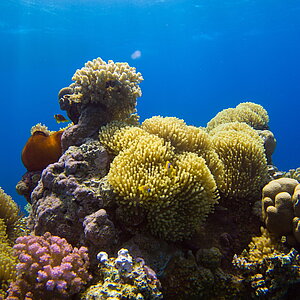CoralCarib: Pioneering a new strategic approach for conserving and restoring Caribbean coral reef ecosystems that targets Climate Resilient Refuges.
The future of the Caribbean is closely tied to the health of its coral reefs. Live coral cover – a key measure of coral health – in the Caribbean has declined by 60% over the past few decades due to a combination of global and local threats. Degradation of coral reef ecosystems threatens the region’s population, as local economies depend heavily on healthy reefs, which provide over €0.85 million per km2 in critical ecosystem goods and services (e.g., fisheries, coastal protection, tourism and recreation). This project will pioneer a new strategic approach focused on Coral Climate Refugia, with activities designed to protect, restore, and sustainably use coral reefs with high potential to survive future climate impacts. Major activities include effective management of marine areas, abatement of reef threats, coral restoration using advanced technologies, promotion of sustainable livelihoods, and a range of scaling activities to achieve region-wide impacts.
- Countries
- Belize, Cuba, Dominican Republic, Haiti, Jamaica
- IKI funding
- 6,500,000.00 €
- Included preparation phase
- 150,000.00 €
- Duration
- 11/2022 till 10/2028
- Status
- open
- Implementing organisation
- The Nature Conservancy (TNC) - International
- Political Partner
-
- Belize Fisheries Department - Belize
- Ministry of Housing, Urban Renewal, Environment and Climate Change (MHURECC ) - Jamaica
- Ministry of Science, Technology and the Environment (CITMA) - Cuba
- Ministry of the Environment - Haiti
- National Council for Climate Change and the Clean Development Mechanism - Dominican Republic
- Implementing Partner
-
- Alligator Head Foundation
- Dominican Foundation of Marine Studies
- Grupo Puntacana Foundation
- Haiti Ocean Project (HOP)
- Haiti’s Environment and Integrated Development Initiative (IEDIH)
- National Aquarium of CUBA
- University College London (UCL)
State of implementation/results
- 04/2023: The Nature Conservancy hosted a kick-off meeting to officially launch the CoralCarib project with the participation of the CoralCarib Consortium and Local Implementing Partners, the project sponsor, key political partners, and stakeholders. The launch event was followed by a three-day Consortium coordination and work planning meeting.
- Modelling methodology for refugia site selection:
- The new scientific modelling methodology used to select project implementation sites in the project countries of Cuba, Dominican Republic, Haiti, and Jamaica was published in the journal Global Climate Change. The open access publication can be found at this link: onlinelibrary.wiley.com/…
- The results of the new scientific modelling methodology used to identify Coral Climate Refugia (where reefs will be most likely to survive future climate change) and select project implementation sites was made publicly available for the Caribbean region and Florida on The Nature Conservancy’s website: sites.google.com/…
- 07/2023: 20 marine managers and practitioners from Cuba, the Dominican Republic, Haiti, and Jamaica participated in the CoralCarib Restoration Action Plan Workshop & Learning Exchange held in Punta-Cana and Bayahibe in the Dominican Republic.
- This five-day workshop and learning exchange focused on coral restoration planning and design using the The Nature Conservancy’s Manager’s Guide to Coral Reef Restoration Planning and Design to start the process of drafting restoration action plans for implementation sites in these four countries.
- Participants also had two days of site visits and hands-on training on land-based coral nurseries, coral micro-fragmentation techniques, and sexual reproduction techniques with project partners Fundación Grupo Puntacana (FGPC) and Fundación Dominicana de Estudios Marinos (FUNDEMAR).
- This training was organized by The Nature Conservancy Caribbean with support from the Reef Resilience Network. Staff, partners, and hosts included: Dr. Elizabeth Shaver (TNC Caribbean), Cherie Wagner (TNC/RRN), Dr. Denise Perez (TNC Caribbean), Maxene Atis (TNC Caribbean), Yolanny Rojas (TNC Caribbean), FGPC, and FUNDEMAR.
- Besides the implementing partners, workshop participants included government officials of the Ministry of Environment and Protected Areas Agencies of Cuba, Haiti, Dominican Republic and Jamaica.
Latest Update:
05/2024
Project relations
Legend:
The link has been copied to the clipboard




